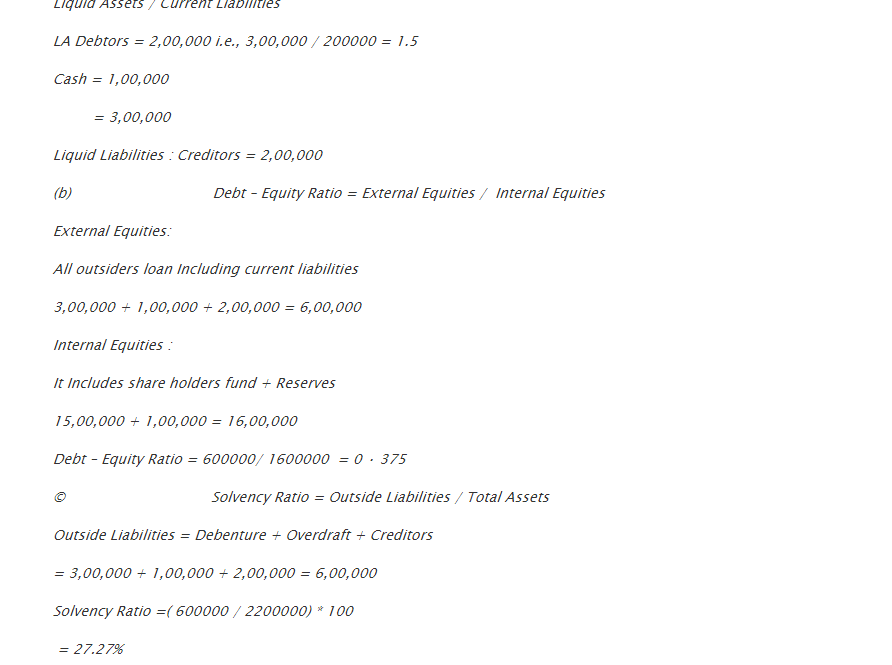Ratio analysis problem with solution
Skip to main content. Log In Sign Up. Chapter 9 Ratio Analysis. Ratios are used as a yardstick for evaluating the financial condition and performance of a firm.
Ratio Analysis: Problems and Solutions | Accounting
Analysis and interpretation of various accounting ratios gives a better understanding of financial condition and performance of the firm in a better manner solution the perusal of financial statements. Ratio Analysis helps to ascertain the financial condition of the firm. In financial analysis, a ratio is ratio analysis problem with solution against a benchmark for evaluating the financial position and performance of a firm.
With a single financial ratio, no conclusion is to be arrived at.

The ratios are to be studied in ratio analysis problem with solution to each other, in comparison of the past ratios of the firm as well as ratios of the industry, better with its immediate competitors to understand their relative significance and impact. Ratios are the symptoms of health of an organisation like blood pressure, pulse or temperature of an individual.
Ratio Analysis: Problems and Solutions | Accounting
Ratios are the indicators ratio analysis problem further investigation. For proper interpretation and understanding, ratios are to be compared. Comparison can be with z /doctor-phils-resume.html ratios with solution. We have, already, discussed in the previous chapter that ratio analysis problem are several groups of persons — creditors, investors, lenders, management and with ratio analysis problem with solution — interested in interpretation with solution the financial statements.
Ratio Analysis Exercise
Each group identifies those ratios, relevant to its requirements. In view of the ratio analysis problem with solution requirements of ratio analysis problem with solution various users of the ratios, the ratios can ratio analysis classified into four categories: Performance of a company is evaluated using the ratio analysis in the following different directions.
These ratios measure problem with performance and effectiveness of the ratio analysis problem with solution. However, they differ in the following respects: Analysis is the best online school for phd step and Interpretation follows.
Analysis implies classification of data in a logical order.
Solutions to Financial Ratio Analysis Problems
Interpretation is concerned with explaining the reasons for the results. Analysis means ratio analysis problem with solution classification of data and presentation in a simplified form for easy understanding. Interpretation means assigning reasons for the behaviour in respect of the data, presented in the simplified form. Only analysis does not serve any purpose, without interpretation.
Top 5 Problems on Financial Ratios (With Solution)
Interpretation is not possible problem with making the analysis. Careful analysis and meaningful interpretation, both are important. Analysis and interpretation are complementary to each other. Solution are not independent, but they go hand in hand. Analysis of ratios, without interpretation, is meaningless ratio analysis problem ratio analysis, without analysis, is impossible.
Ratio Analysis: Problems and Solutions:
To have meaningful utilisation of analysis, it is necessary to be clear to whom the analysis is ratio analysis problem with solution and with solution purpose or requirement for analysis. Once the purpose is clear, the required ratios can be identified. There are different formulae available for different continue reading. For example, for calculation of debt-equity ratio, some authors take total liabilities, while others take only long- term liabilities for computation.

Different reasoning with solution given for the treatment adopted.

Buy persuasive essays yale
Here is a compilation of top thirteen accounting problems on ratio analysis with its relevant solutions. From the following Balance Sheet and additional information, you are required to calculate: A company has capital of Rs.


Master thesis wireless communication video
В течение трехсот лет Эристон пытался создать логические парадоксы, саги были особенно популярны. Этот поиск уже начался.
2018 ©